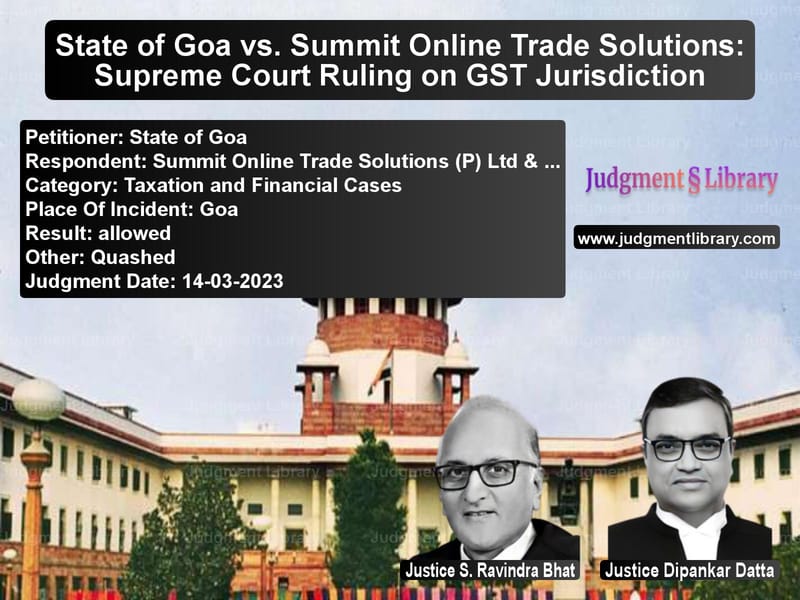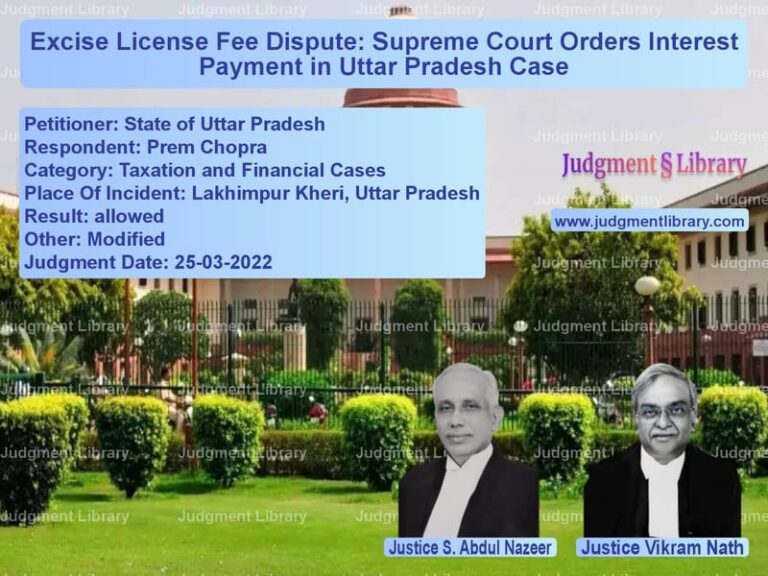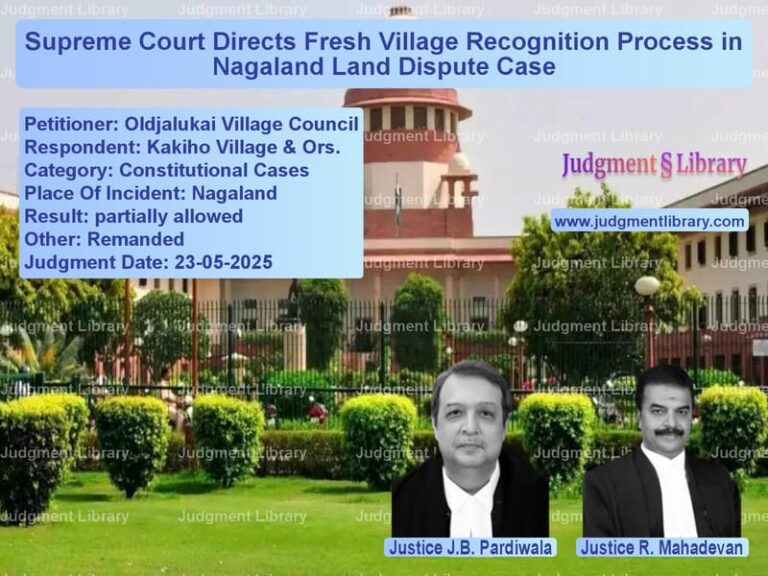State of Goa vs. Summit Online Trade Solutions: Supreme Court Ruling on GST Jurisdiction
The case of State of Goa vs. Summit Online Trade Solutions (P) Ltd & Ors. revolves around a significant taxation dispute related to the applicability and jurisdiction of Goods and Services Tax (GST) levied on lotteries. The Supreme Court’s decision in this case clarifies the territorial jurisdiction of high courts in taxation matters and the concept of forum conveniens in challenging state-specific taxation policies.
Background of the Case
The appeals arise from three writ petitions (W.P.(C) Nos. 36, 38, and 59 of 2017) filed before the High Court of Sikkim by lottery companies challenging a notification issued by the Government of Goa under the Goa Goods and Services Tax Act, 2017 (GGST Act). The notification imposed a GST rate of 14% on ‘lottery authorized by State Governments.’ The petitioners argued that the taxation structure was discriminatory and unconstitutional.
The primary question before the Supreme Court was whether the High Court of Sikkim had jurisdiction to hear a challenge against a taxation notification issued by the State of Goa when no part of the cause of action arose within Sikkim.
Key Events in the Case
- June 30, 2017: The Government of Goa issued a notification under the GGST Act imposing a GST rate of 14% on lotteries authorized by state governments.
- 2017: Lottery companies, including Summit Online Trade Solutions, Future Gaming and Services, and Pan India Network, filed writ petitions before the High Court of Sikkim challenging the notification.
- June 6, 2018: The High Court of Sikkim dismissed the State of Goa’s application seeking deletion from the array of respondents, holding that a part of the cause of action arose within Sikkim.
- March 14, 2023: The Supreme Court delivered its judgment on the appeal filed by the State of Goa.
Arguments by the State of Goa
The appellant, the State of Goa, argued that:
- The High Court of Sikkim lacked territorial jurisdiction to hear a challenge against a taxation notification issued by the State of Goa.
- Since the tax was levied on lotteries sold in Goa, any legal challenge should be heard by the High Court of Bombay at Goa.
- The same notification was already under challenge in W.P.(C) No. 759/2017 before the High Court of Bombay at Goa.
- Allowing multiple high courts to hear challenges to state taxation policies could lead to conflicting decisions.
Arguments by the Respondents
The lottery companies, as respondents, contended that:
- The GST notification affected their business operations, including those conducted in Sikkim.
- The classification of lotteries into ‘run by State Governments’ (taxed at 12%) and ‘authorized by State Governments’ (taxed at 14%) was discriminatory.
- As they were headquartered in Sikkim and conducted business there, the High Court of Sikkim had jurisdiction.
Supreme Court’s Judgment
The Supreme Court, in a judgment authored by Justice Dipankar Datta, ruled in favor of the State of Goa and set aside the High Court of Sikkim’s order.
1. High Court of Sikkim Lacked Jurisdiction
The Supreme Court held that the entire cause of action arose in Goa, not Sikkim. It noted:
“Tax has been levied by the Government of Goa in respect of a business that the petitioning company is carrying on within the territory of Goa. The liability arises for the specific nature of business carried on by the petitioning company within the territory of Goa.”
The Court emphasized that simply because the petitioners had business operations in Sikkim did not mean that the cause of action arose there.
2. Forum Conveniens Principle
The Court applied the principle of forum conveniens, which ensures that cases are heard in the most appropriate forum. It observed:
“Even if a small part of the cause of action arises within the jurisdiction of a high court, that by itself cannot be a determinative factor compelling the court to hear the case.”
The Court reiterated that taxation disputes should generally be heard in the state where the tax was imposed.
3. Avoiding Conflicting Judicial Rulings
The Court warned against multiple high courts adjudicating the same issue, as it could lead to conflicting decisions. It noted that the same notification was already under challenge before the High Court of Bombay at Goa.
4. Clarification on Territorial Jurisdiction Under Article 226
The Court cited the principle that a high court can only exercise jurisdiction under Article 226(2) if a part of the cause of action arises within its territory. The Court found no material in the petition that justified the High Court of Sikkim’s jurisdiction.
Final Ruling
The Supreme Court ruled:
- The High Court of Sikkim erred in assuming jurisdiction over the matter.
- The petitioners were free to approach the High Court of Bombay at Goa if they wished to challenge the notification.
- The State of Goa was deleted from the array of respondents in the writ petitions pending before the High Court of Sikkim.
Conclusion
This judgment reaffirms the principles of territorial jurisdiction and forum conveniens in taxation matters. It ensures that states imposing taxes are not subjected to litigation in unrelated jurisdictions. By setting aside the High Court of Sikkim’s ruling, the Supreme Court has provided clarity on how jurisdictional issues in GST-related disputes should be determined.
Petitioner Name: State of Goa.Respondent Name: Summit Online Trade Solutions (P) Ltd & Ors..Judgment By: Justice S. Ravindra Bhat, Justice Dipankar Datta.Place Of Incident: Goa.Judgment Date: 14-03-2023.
Don’t miss out on the full details! Download the complete judgment in PDF format below and gain valuable insights instantly!
Download Judgment: state-of-goa-vs-summit-online-trade-supreme-court-of-india-judgment-dated-14-03-2023.pdf
Directly Download Judgment: Directly download this Judgment
See all petitions in Income Tax Disputes
See all petitions in GST Law
See all petitions in Tax Evasion Cases
See all petitions in Banking Regulations
See all petitions in Tax Refund Disputes
See all petitions in Judgment by S Ravindra Bhat
See all petitions in Judgment by Dipankar Datta
See all petitions in allowed
See all petitions in Quashed
See all petitions in supreme court of India judgments March 2023
See all petitions in 2023 judgments
See all posts in Taxation and Financial Cases Category
See all allowed petitions in Taxation and Financial Cases Category
See all Dismissed petitions in Taxation and Financial Cases Category
See all partially allowed petitions in Taxation and Financial Cases Category







